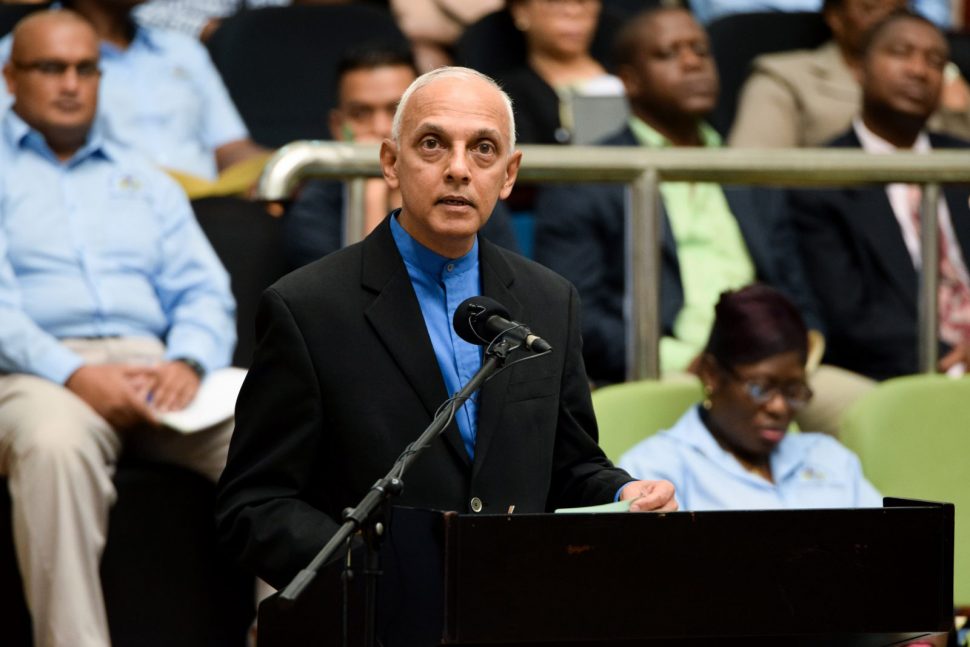Democratically-elected local authorities have to come up with ways to generate the revenue needed to fulfil their constitutional responsibilities and ensure their autonomy, Minister of Communities Ronald Bulkan says.
“Leadership is the determining factor for the effectiveness of local organs in the discharge of their task of community development,” Bulkan said during his address at the opening of the one-day National Conference of Local Democratic Organs, held yesterday at the Arthur Chung Conference Centre.
Bulkan said the presence of central government ministries and agencies at the meeting was in anticipation that the deliberations would feed into budget 2019 and beyond to ensure more effectiveness at the local level. However, in terms of where the local democratic organs (LDOs) will get their resources, Bulkan said, “not central government. We are moving away from that. You must come up with creative ways, within the confines of the law and with the voice of your communities included, to generate needed revenue.”
Noting that the laws provide for revenue sources to come from within local jurisdictions, he questioned the autonomy of councils if they have to ask someone else to pay their bills. “Self-financing and autonomy are complementary,” he pointed out.
Many councils have made significant progress since they took office, he said, but a key issue is that they lack resources because of inadequate and poor collection of rates from their constituents.
The Municipal Property Assessment Corporation (MPAC)/Axilogic of Canada, which has been awarded a contract for the national property inventory and valuation, will begin a testing of its methodology in a pilot in the New Amsterdam municipality shortly, he noted. “When completed, the updated property register will be shared with the respective LDOs and should serve as the basis to set the rates, however they deem fit and necessary,” he explained.
Bulkan added that the ministry will not be visiting with LDOs to set a rate “as is deliberately misrepresented in some places. Each council will make their own decision.”
The NCLDO was the product of careful assessment of the system, he said, which had identified leadership, or lack of effective leadership as one inhibiting factor to the effective performance of LDOs.
Government was aware, he said, of the systematic efforts to undermine local leadership as in the previous government not holding local government elections for about two decades. The conference’s theme, “Catalysing local government leadership for community and national development,” he said, highlights the importance of leadership and the need to enable the local governance structure to support the required local leadership critical to local and national development.
As a result, he said, the conference was structured to cover topics such as Leadership of Council for Chairpersons and Vice-Chairpersons of Regional Democratic Councils and Neighbourhood Democratic Councils, mayors and deputies, and councillors; Leadership of Constituency, and Leadership of the Admin-istration.
The material used to guide the sessions was taken from the “Handbook for Councillors of Municipalities and Neighbourhood Democratic Councils,” a reference manual that was prepared “at great cost” and previously distributed to about 1,170 councillors and administrative staff.
While the country was bequeathed a fairly progressive system of governance by the founding leaders, Bulkan said, for well-known reasons, its evolution and development has not kept pace with expectations.
Government possesses the political will to ensure that meaningful local democracy obtains, he said, “and we will strive to restore functionality to the system.”
Government recognised, he said, “that empowering people to govern their own affairs will contribute to destroying the failed ‘winner takes all’ approach that plagued our political system.” It is for that reason, he said, eight additional NDCs of the 129 established by Order 51 of 1990, have been activated as well as the proposed establishment of Mahdia as the capital town of the Potaro-Siparuni region.
About 91 per cent of the electorate, he said, will now fall within LDOs exclusive of Amerindian neighbourhoods. He said, “Our mandate as set out by President Granger is to reverse the culture of control and dominance by the central government and replace it with the attitude of collaboration and facilitation to ensure that local organs are empowered to deliver effective, efficient and sustainable services.”










